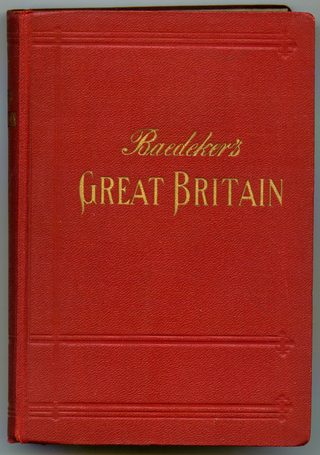
Verlag Karl Baedeker, founded by Karl Baedeker on 1 July 1827, is a German publisher and pioneer in the business of worldwide travel guides. The guides, often referred to simply as "Baedekers", contain, among other things, maps and introductions; information about routes and travel facilities; and descriptions of noteworthy buildings, sights, attractions and museums, written by specialists.
Bohnenspiel is a German mancala game described in the 1937 Deutsche Spielhandbuch.

The Wiener Werkstätte, established in 1903 by the graphic designer and painter Koloman Moser, the architect Josef Hoffmann and the patron Fritz Waerndorfer, was a productive association in Vienna, Austria that brought together architects, artists, designers and artisans working in ceramics, fashion, silver, furniture and the graphic arts. The Workshop was "dedicated to the artistic production of utilitarian items in a wide range of media, including metalwork, leatherwork, bookbinding, woodworking, ceramics, postcards and graphic art, and jewelry." It is regarded as a pioneer of modern design, and its influence can be seen in later styles such as Bauhaus and Art Deco.

Fantasy Productions Medienvertriebsgesellschaft GmbH is a German publishing company based in Erkrath.

Mensch ärgere Dich nicht is a German board game, developed by Josef Friedrich Schmidt in 1907/1908. Some 70 million copies have been sold since its introduction in 1914 and it is played in many European countries.

Habermaaß GmbH is a German toy manufacturing company based in Bad Rodach, Bavaria. The company defines itself as an “Inventor for inquisitive minds”, offering a broad selection of products such as wooden and textile toys, home furnishings and accessories for babies and children. The company was owned and runed by Klaus Habermaaß and the managing director Harald Grosch.

Germany has the second-largest video games player base in Europe, with 44.3 million gamers in 2018, after Russia. Consumers in Germany spent €5.87 billion on video games over the course of 2021, a 3 percent year-on-year increase from 2020. The video game market in Germany grew by 6 percent to €6.2 billion in 2019.
Lands of Lore: Guardians of Destiny is a 1997 action role-playing game, second installment of the Lands of Lore series, a sequel to Lands of Lore: The Throne of Chaos. It brought about a drastic change in gameplay style from its predecessor, opting away from the original's D&D turn-based style in favor of more action elements. A sequel, Lands of Lore III, was released in 1999.

Kingsoft GmbH was a German video game company based in Aachen. The company was founded in 1982 by Fritz Schäfer out of his parents' house in Mulartshütte (Roetgen) to sell his chess simulation game Boss, which he developed the year before. Kingsoft expanded into third-party publishing in 1983, starting with Galaxy by Henrik Wening. Most of their games were released for computers developed by Commodore International, predominantly the Commodore 64, Commodore 16 and later Amiga, and were usually based on other company's titles for different platforms. Kingsoft moved to Aachen in 1987 and established a distribution service before ceasing publishing in favour of distribution in 1993. The company was acquired in March 1995 by Electronic Arts, who retired the Kingsoft name later that year.

Friedrich Pustet GmbH & Co. KG, known as Pustet, is a German publishing house located in Regensburg specializing in scientific literature, particularly in the fields of history and theology. Apart from publishing, Pustet operates a book printing firm and a chain of company-owned book stores across Germany.

Deutsche Wirtschaftsbetriebe, abbreviated DWB, was a project launched by Nazi Germany in World War II. Organised and managed by the Allgemeine SS, its aim was to profit from the use of slave labour extracted from the Nazi concentration camp inmates.
Josef Friedrich Schmidt was a German board game inventor.
Yager Development GmbH is a German video game developer based in Berlin.
4Players is a German online magazine that provides news and reviews of video games and related content. Established in August 2000, 4Players is owned by the Hamburg-based company 4Players GmbH, an indirect subsidiary of the Marquard Group conglomerate.

Rosenthal GmbH is a German manufacturer of porcelain products and other household goods. The original firm was founded in 1879 in Selb, Bavaria. Since 2009, Rosenthal has been owned by the Italian company Sambonet Paderno Industrie.

ASS Altenburger is since 2003 the trademark of the German playing card manufacturer Spielkartenfabrik Altenburg, based in the town of Altenburg. The firm is owned by Cartamundi, of Turnhout, Belgium. ASS claims to be the market leader in Germany for playing cards. Every year almost 40 million packs of cards of many different types are manufactured in Altenburg.
Peri Spiele was an Austrian board game, card game and playing card manufacturer based in Scharnstein in Upper Austria.

Nürnberger-Spielkarten-Verlag (NSV) is a German playing card manufacturer and board game publisher based in Nuremberg. It was founded in 1989 after outsourcing from the publishing house of F.X. Schmid and builds on the "Heinrich Schwarz Playing Card Factory, Nuremberg" founded in 1948. The company produces playing cards and dice games and, especially in recent years, increasingly proprietary games from various game authors.

German Tarok, sometimes known as Sansprendre or simply Tarok, is an historical ace–ten card game for three players that emerged in the 18th century and is the progenitor of a family of games still played today in Europe and North America. It became very popular in Bavaria and Swabia during the 19th century before being largely superseded by Schafkopf, but has survived in the local forms of Bavarian Tarock and Tapp. During the mid-19th century, it became the most popular card game among Munich's middle classes and was also played in the late 19th and early 20th centuries by notable Bavarian author Ludwig Thoma, frequently appearing in his novels and journal articles. It was superseded after the First World War by other forms such as Bavarian Tarock.
Hexagames was a German game publisher in Dreieich, which existed from 1982 to 1992. It was one of the most famous German game publishers of the 1980s, notable for publishing games such as Lines of Action (1988) and Cosmic Encounter (1992).